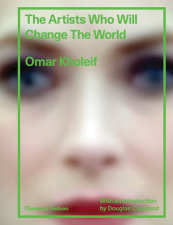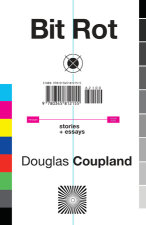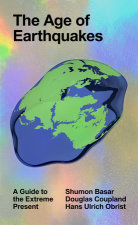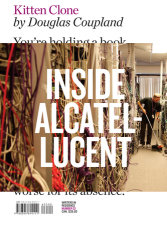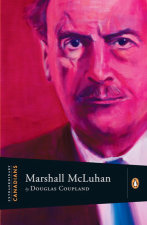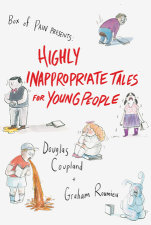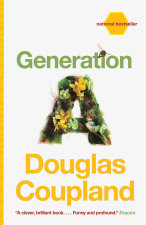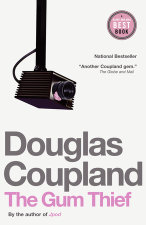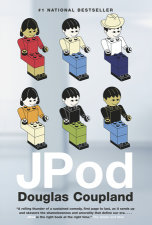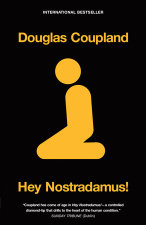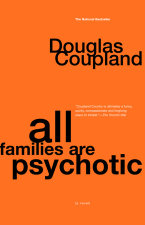Reading Guide
From Hey Nostradamus!

Hey Nostradamus! by Douglas Coupland
The critically acclaimed, national bestseller, now in paperback.
Paperback
1. Discuss Cheryl’s description of the events in the cafeteria. Does her step-by-step account and her sense of calm make the actions of the young shooters seem more or less real? Is there immediacy here, or distance?
2. Which of the novel’s four narrative voices did you connect with the most? Which the least?
3. One reviewer has written that Cheryl is among the most “spiritually mature” characters in this novel. What do you think?
4. How did the time span of the novel (about 15 years) affect your view of the characters, and the event that set this story in motion?
5. Some reviewers have suggested that this is Douglas Coupland’s most spiritual book to date. Through his characters’ struggles with belief, is Douglas Coupland being supportive or critical of the Christian faith? Or a bit of both? Compare the different approaches to faith shown by the four main characters.
6. Discuss the epigraph from 1 Corinthians that appears at the start of the book. What is Coupland saying about hope and redemption in this novel? Are any of his characters redeemed? Ultimately, what forms does hope take in their lives?
7. Jason’s narrative exists in the form of an open letter to his brother Kent’s twin sons. Heather begins writing her story directly into official court transcripts at work. Reg posts thousands of copies of his narrative in the forest near Chilliwack. Discuss the importance of writing and correspondence in this novel. What might Coupland be saying about the act of writing in general, or about how we as a society deal with grief? Consider also the letters Jason receives from Cheryl’s family, the various letters to God that Cheryl begins composing in her head, and even the list that Jason leaves with the psychic.
8. The title of this book comes from Jason’s reaction to his mother’s “Nostradamus kick” after the massacre, as she searches the astrologer’s prophecies for some sign of it (page 91). Do you think the title fits the book? Why or why not? Discuss how foreseeing the future might relate to this novel.
9. What kind of a person is Heather? What is it about her that appeals to Jason, and allows Reg to open up to her – or perhaps even change?
10. How did your memories of school shootings like those at Columbine and the École Polytechnique affect your reading of this novel? Has Hey Nostradamus! changed the way you think about such horrific events and their aftermath?
11. Cheryl tells us that her conversion took place in her backyard as she sat surrounded by huckleberry bushes, experiencing the smells of warm cedar and dry fir. “The moment made me feel special, and yet, nothing makes a person less special than conversion – it… universalizes you.” Discuss the association of spirituality with the natural world in Hey Nostradamus!
12. Did your opinion of Reg change by the end of the book? Why or why not?
13. Jason tells us that a few celebrities emerged from the massacre: himself, first vilified, then cleared; Cheryl, whose GOD IS NOWHERE/GOD IS NOW HERE note was widely reported as miraculous; and the shooter who repented, only to be shot by the other two. What is Coupland saying about our need to find heroes and villains in such situations? And what is the media’s role in feeding, or creating, this need?
14. While reading, how did you feel about Coupland’s use of humour in the novel? Did it seem out of place at any point, considering the subject matter? Or did it seem to grow naturally out of his characters’ reactions to their experiences? Is embracing the humour, or everyday-ness, of difficult events sometimes the only way to make it through them?
DOUGLAS COUPLAND is a Canadian writer, visual artist and designer. His first novel is the 1991 international bestseller Generation X: Tales for an Accelerated Culture, still celebrated for its biting humour and cultural relevancy thirty years since initial publication. He has published fourteen novels, two collections of short stories, eight nonfiction books. He has written and performed for England's Royal Shakespeare Company, is a columnist for The Financial Times of London and a frequent contributor to The New York Times. In 2000 Coupland amplified his visual art production and has recently had two separate museum retrospectives, Everything is Anything is Anywhere is Everywhere at the Vancouver Art Gallery, The Royal Ontario Museum and the Museum of Contemporary Canadian Art, and Bit Rot at Rotterdam's Witte…

